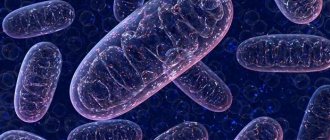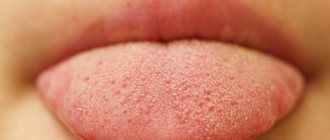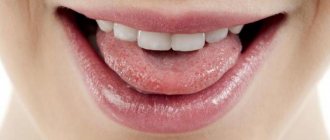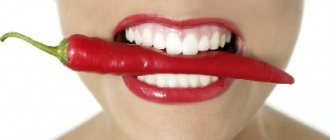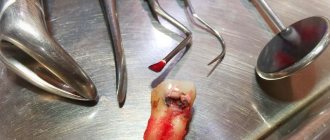Functions of the sky and structural features
The palate is a vault that separates the oral cavity from the nasopharynx. The structure of the palate consists of two sections - hard and soft. This organ performs an important function - it prevents food from entering the nasopharynx from the oral cavity.
In addition, receptors on the surface of the palate are associated with the larynx and take part in articulation and influence the timbre of the voice and the pitch of sounds. Thus, the inflammatory process of the upper palate disrupts all the functions of this important organ, and therefore requires mandatory treatment.
Complications
The consequences of delayed treatment are complications that lead to irreversible deformations, which are more difficult to deal with than with the initial stages of development.
A person neglects to visit a gastroenterologist, but the symptoms subside, creating the impression that everything went away on its own. But in reality it is different, and this means the development of erosion processes on the walls. This quickly leads to bleeding, leading to death. Ulcers also form on the mucous membranes. This is a common cause of destruction of blood vessels. A sign of intestinal bleeding will be dark liquid stools, speckles of blood in the feces, and if the upper part of the intestinal tract is damaged, bloody, foamy vomit, the color of coffee grounds, will occur. Blood loss leads to iron deficiency anemia and vitamin B12 deficiency.
Gastritis can provoke inflammation of the pancreas, and a dangerous, painful process develops - pancreatitis. The gallbladder can also become inflamed - cholecystitis, the duodenum - duodenitis;
With a constant lack of appetite, anorexia develops, rapid weight loss, and exhaustion.
Also, without timely seeking medical help, there is a risk of developing oncological pathologies, especially with a burdened hereditary predisposition.
Why does inflammation occur?
The muscular structure of the palate is covered on top with a mucous membrane, which is subject to the development of an inflammatory process. Inflammation often occurs under the influence of such factors:
- burn of the mucous membrane as a result of consuming excessively hot food and drinks;
- damage to the palate due to dental diseases - periodontitis, stomatitis, caries, pulpitis;
- disruption of the oral environment due to the action of metals - when wearing braces or installing crowns;
- smoking;
- allergic reactions to medications;
- neurological diseases affecting the joints of the upper or lower jaw;
- osteomyelitis - an infectious lesion of the bone tissue of the jaw;
- malignant neoplasms;
- infectious diseases of the upper respiratory tract - sore throat, tonsillitis, pharyngitis, rhinitis.
The development of the inflammatory process of the palate may be facilitated by some of these causes in their entirety or separately from each other.
Why does my mouth hurt?
Pain in the mouth can be caused by both local and systemic factors. Painful sensations in the oral cavity usually do not bother you in isolation. As a rule, they are combined with other symptoms characteristic of a certain pathology: hyperemia and swelling of the mucous membrane, rashes and ulcers in the oral cavity, plaque, unpleasant odor, difficulty chewing and opening the mouth, and salivation. Pain in the mouth, despite its local nature, disrupts general well-being and performance, and prevents normal diction and proper food intake.
Lip pain
Is local or diffuse in nature. It can be caused by traumatic, infectious, chemical, physical factors, or tumor lesions. The pain is usually combined with dry lips, cracks, redness, blistering rashes, ulceration, and dry crusts. Common causes of lip pain:
- Cheilitis.
It may be a consequence of sensitization (allergic cheilitis), neurogenic causes (exfoliative, macrocheilitis), unfavorable climatic factors (meteorological cheilitis), vitamin deficiency (hypovitaminous cheilitis), infection (glandular cheilitis). Common signs are damage to the red border, accompanied by dryness, painful cracks and ulcers, swelling, burning, itching. - Labial herpes.
In the prodromal period, local tingling, tingling, itching in the area of the upper or lower lip is noted. Then a bubble containing liquid appears. After spontaneous or forced opening of the vesicle, an ulcer forms in its place, which dries out and becomes covered with a scab. When the crust cracks, ichor oozes out from under it. Elements of herpes are sharply painful at all stages. It takes 10-12 days from the prodrome to complete epithelialization. - Lichen planus.
May affect the red border of the lips, tongue, and oral mucosa. The main elements are papules, which, when fused, form whitish areas of keratinization. Sometimes LLP occurs with the formation of weeping areas, erosions, blisters - in these cases, a burning sensation and severe pain in the mouth are added, making it impossible to eat. - Trigeminal neuralgia.
Trigeminal neuralgia is a common cause of facial pain. When the maxillary and mandibular branches of the trigeminal nerve are damaged, sharp, intense shooting pains in the cheek, upper or lower lip, or jaw, reminiscent of electric shocks, may occur. - Injuries.
Lip burns can be caused by drinking hot drinks, exposure to harsh chemicals, or exposure to sunlight or open flames. With mild burns, pain, swelling of the lip, and hyperemia appear; in severe cases, blisters, scabs, and tissue necrosis form. Mechanical damage (cuts, biting) to the lips is accompanied by pain and bleeding. - Lip cancer.
Externally it may appear as a warty or papillomatous growth or infiltrate. At first, the elements do not cause discomfort, but their ulceration, infection, and decay are accompanied by severe pain in the mouth.
Transient swelling and soreness of the lips are observed after a number of cosmetic procedures and surgical interventions: permanent makeup, piercing, injection of hyaluronic fillers, cheiloplasty.
Mouth pain
Pain in gums
As a rule, it is associated with diseases of the oral cavity or behavioral factors (incorrect selection of a toothbrush, use of toothpicks, smoking). Pathologies that cause pain in the gums:
- Inflammatory processes.
Painful sensations in the mouth are a pathognomonic sign of inflammatory diseases: gingivitis, stomatitis, periodontitis. With gingivitis, the gums become swollen, painful, and bleeding. Stomatitis can occur with the formation of plaque in the mouth, extremely painful aphthae and ulcers. With periodontitis, pain in the gums is aggravated by bad breath, the formation of periodontal pockets, suppuration, and loosening of teeth. - Periodontitis.
In acute periodontitis or exacerbation of a chronic process, painful swelling of the gums occurs in the area of the affected tooth. When the pyogenic flora is activated, a flux is formed, accompanied by throbbing pain. When it is opened, a fistula may form. Severe pain occurs during chewing and speaking. - Injuries.
Damage to the gums can occur both from direct mechanical impact and from difficult tooth eruption. In the latter case, pericoronitis develops. Injury to gum tissue and pain are also accompanied by dental procedures: tooth extraction, installation of a dental crown/prosthesis, dental implantation, operations (gingivotomy, gingivoplasty, etc.). - Allergy.
May be caused by a reaction to denture materials, medications, or local anesthetics. It occurs in the form of allergic stomatitis, cheilitis, glossitis. Characterized by hyperemia, burning, swelling of the mucous membrane, hypersalivation, pain when eating.
Tongue pain
Pain in the tongue is associated with local infectious-inflammatory, traumatic, allergic, neurogenic, and neoplastic processes. In addition to local factors, pain in the mouth can be provoked by systemic diseases: hypovitaminosis B1, B2, B12, pellagra, iron deficiency anemia, collagenosis, leukemia, etc. Local causes of pain in the tongue:
- Glossitis.
Pain of varying intensity is observed with desquamative, candidal, herpetic, allergic, traumatic and other glossitis. Swelling, glossodynia, plaque, and changes in taste sensitivity may also occur. - Xerostomia.
It is a consequence of radiotherapy, chemotherapy, medication, smoking, Sjogren's disease, diseases of the salivary glands. Dry mouth makes eating, swallowing, and speaking difficult and painful. - Glossalgia.
It occurs with attacks of burning pain in the tongue, which are more pronounced in its tip and lateral surfaces. There is hyperemia or pallor of the tongue. Repeated painful attacks change the psychological state of patients - they become irritable, suspicious, and tearful. - Galvanism.
Develops as a result of irrational prosthetics. It is characterized by swelling and hyperemia of the tongue, sensations of pain, burning, rawness, and a metallic taste in the mouth. - Neuropathies.
Pain in the tongue of neurogenic origin occurs with neuralgia of the glossopharyngeal and hypoglossal nerves. In the first case, the pain is localized in the area of the root of the tongue, in the second - in the back of the tongue. More often it is unilateral in nature, occurs in paroxysms, and is provoked by talking, coughing, and swallowing. It has an intense pulsating, drilling, burning character. - Tongue cancer.
Manifests with the appearance of painless or slightly painful formations: growths, ulcers, compactions. In the advanced stage, local or diffuse pain occurs, radiating to the jaw, ear, and temporal region. Salivation increases, foul breath appears, spontaneous bleeding from the tongue, difficulty articulating and swallowing.
Dental diagnostics
Signs and symptoms of inflammation of the palate
Depending on the causes of inflammation in the oral cavity, a person may experience the following unpleasant symptoms:
- A feeling of acute pain that makes it difficult to eat. Soon the pain increases, sometimes even swallowing becomes impossible.
- If the inflammation is caused by the action of a fungus, a white coating and erosion forms on the surface of the palate. The process is accompanied by an unpleasant putrid odor from the mouth.
- When the cause of inflammation is an infectious lesion - sore throat or tonsillitis, the palate becomes red and swollen.
- In case of acute inflammation, an increase in body temperature and fever is possible.
- If the cause is dental disease, the patient will be bothered by toothache.
- With cancer, the patient complains of aching pain in the palate.
Treatment methods
In most cases, the inflammatory process can be stopped by conservative treatment. Therapy may include:
- rinsing the mouth with herbal infusions and antiseptic solutions,
- treating affected areas with ointments and gels,
- taking painkillers and antipyretics, antibiotics, drugs that stimulate tissue regeneration, vitamin and mineral complexes.
If the inflammation was caused by poor-quality prosthetics, a new prosthesis may need to be installed.
How is inflammation of the palate treated?
How to treat inflammation on the roof of the mouth, a specialist will tell you after determining the diagnosis. The following therapy methods can be used:
- If the cause of inflammation is minor damage to the mucous membrane, rinsing with decoctions of medicinal herbs is usually sufficient. Decoctions and infusions based on calendula, sage and chamomile have an antiseptic and healing effect. The herbal decoction for rinsing should be used warm.
- When the palate is affected by a fungus, patients are prescribed topical agents. The most effective are the solution and gel “Chlorhexidine”, “Rotokan” or “Stomatofit”.
- In case of severe pain symptoms, regardless of the cause of inflammation, drugs of combined action are prescribed. “Cholisal-gel” and “Kalgel” have proven themselves well.
- If a purulent inflammatory process is detected in the oral cavity, the patient is prescribed antibiotics. The minimum course of treatment is usually 7 days, but there are also stronger drugs that only need to be taken for 3 days. Along with local agents, antibacterial drugs for internal use - Sumamed, Flemoxin Solutab - can be prescribed.
- The inflammatory process of the palate is easily treatable. The earlier therapy is carried out, the less likely it is to develop complications.
Diagnostics
To determine the etiology and therapeutic tactics for pain in the mouth, a comprehensive dental examination is carried out, and, if necessary, an examination of the ENT organs. A number of specialists are involved in diagnosing the causes of pain in the mouth: dental therapist, periodontist, otolaryngologist, allergist-immunologist, neurologist, oncologist, etc. Taking into account nosology, the list of recommended studies includes:
- X-ray diagnostics (OPTG, CT of the jaws, sialography);
- dental examination (visual and instrumental examination, determination of periodontal index);
- ENT diagnostics (pharyngoscopy);
- sonography (ultrasound of the salivary glands, tongue);
- allergy examination (allergy tests, study of individual allergens);
- laboratory tests (analysis of the biocenosis of the oral cavity using bacterial culture, PCR).
Prevention measures
Preventive measures come down to following simple rules:
- brush your teeth at least twice a day; - use mouth rinses every time after meals; - Avoid eating excessively hot food; — enrich the diet with vitamins and microelements to increase local immunity.
Elimination of stressful situations, a balanced diet, regular visits to the dentist and examination of the body - all these actions are reliable prevention of the development of inflammatory processes in the oral cavity.
How to treat inflammation of the palate depends on the causes of the development of the inflammatory process and its symptoms. To determine an accurate diagnosis, you should visit the dentist's office.
This article is for informational purposes only, please consult your doctor for details!
It hurts to open your mouth after dental treatment
It happens that after dental treatment we do not receive the desired relief due to complications that have developed as a result of dental procedures.
Causes
There may be several reasons why it is painful for a patient to open his mouth after dental treatment:
- consequences of wearing braces
: after each correction, the doctor changes the pressure exerted by the arches on the dentition. It takes time to get used to it. However, if after a week the discomfort does not go away, you should additionally consult a doctor; - root canal filling
: moderate pain may be felt for several days, and this is considered normal. But if the pain does not go away longer and even worsens, it is necessary to take an x-ray and consult a doctor; - neuralgic complications
: can occur when a nerve is pinched or inflamed as a result of anesthesia, tooth extraction, incorrectly performed endodontic treatment, etc. A characteristic difference is that the pain manifests itself even at rest and tends to periodically intensify. It not only becomes painful for a person to open his mouth after dental treatment, but also absolutely everything in general. This kind of pain cannot be tolerated. The sooner the patient receives medical help, the better the treatment prognosis; - tissue injury during tooth extraction
. Extraction of a dental unit is considered a full-fledged operation, during which the surrounding tissues, the ligamentous apparatus that holds the dental unit in the socket, and the vessels that supply it are damaged. Often such manipulations are accompanied by the formation of large edema, and suppuration may develop. All this leads to the appearance of severe pain, which makes it painful not only to chew, but also to simply open your mouth. Therefore, if the pain increases over several days, you should additionally consult with your dentist; - dysfunction of the temporomandibular joint
can develop as a result of incorrectly performed dental prosthetics or overestimation of the filling over the bite; - Trismus of the jaw
(spasm of the masticatory muscles) can also be triggered by dental treatment.
Thus, moderate discomfort for several days after dental procedures is normal. But if it hurts to open your mouth after dental treatment after 3-7 days, consult your doctor. Perhaps this is a consequence of complications.
Read more:
- Complications after dental treatment
- Perforation of the maxillary sinus
Prevention and prognosis
Once treatment is started, especially in young people, it is not difficult and quick. The prognosis is favorable in the absence of severe complications, such as transition to oncology.
Prevention before the onset of a disease includes a healthy lifestyle - giving up bad habits, smoking, and giving up alcohol. Rational, regular, nutritious nutrition containing microelements and vitamins necessary for health, reducing to a minimum the need to use medications.
Secondary prevention, that is, after recovery, includes complete abstinence from alcohol-containing drinks, adherence to the prescribed diet, and examination by a gastroenterologist at least once every two years.
Thus, alcoholic gastritis is an easily avoidable disease. There are no moments in life's journey where it is under no circumstances possible to replace alcohol with non-alcoholic drinks. But even if this rule is violated, going to the hospital on time and ensuring a further healthy life after recovery is not difficult.
Author of the article: Yakovlev Evgeniy Anatolyevich
Narcologist, Candidate of Medical Sciences.
